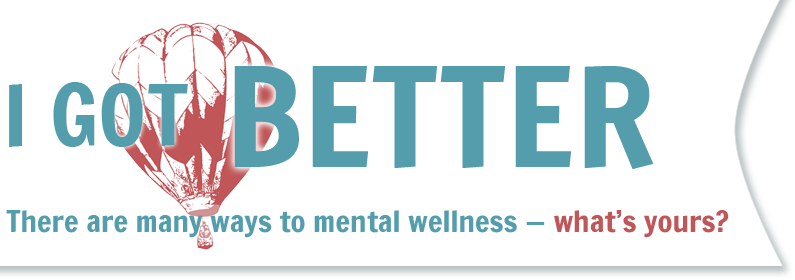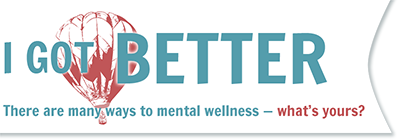I Know Now… I Can Get Back Here, to My Real Life.
By Annette

Has a mental health provider ever told you that you could reach a personal goal despite your psychiatric diagnosis?
I will graduate from my masters in educational technology in April…I was told that because of my sensitivity to sleep disturbances that medicine was not a good choice for me [as a career.] The residency and internship hours would not allow me to regulate my sleep properly and that could very easily destabilize me. I agree. Sleep is the biggest thing for me.
My psychiatrist has always told me that people with chronic issues of any sort are totally capable… Everyone has limitations… My limitations are around getting enough sleep and keeping stress under control…lots of people need that.
When my doctor told me she thought I would do well in a doctoral program, …it felt good that other people believed that I was capable. When I was accepted into a masters program and completed the first course with a great mark, that was a good moment.
In what ways have you found psychiatric medication(s) helpful, if any?
[The medications]…manage symptoms to a certain degree, which allows me to benefit more from psychotherapy and getting back to work. They are about 20% of my recovery, but without controlling the symptoms I can’t concentrate on therapy or work.
During your mental health care, have you often felt hopeless about your chance of getting better?
When I am really low, like when I was hospitalized this year, I feel like it will never get any better…like the good times are an illusion, and anyone who tries to tell me that I will get better is deluded. In dark and miserable times we forget, or discount the good and positive things we have experienced. It is a trick of the mind.
It does get better. I talk to myself and tell myself that the wholly negative view I have of the world is distorted. I distract myself until I can be calm enough to solve problems and I try and make lists of things that have gone well, even if I don’t feel them.
Usually when an episode lifts I start to have hope that I can have a good future. I suspect there will be other episodes, but as long as I stay aware and take a minimal amount of the right meds I am very hopeful that I will live a fulfilling and productive life.
How would you define recovery from mental health or emotional problems in your own words?
Recovery for me means getting back to a functional and enjoyable level every time I have an episode or a rough patch. It means having mental health issues, but not having them be the main thing in my life. It means living well with some limitations, just like everyone else.
It means being able to take the time I need to take care of myself, but always coming back to rejoin the world, being a part of good relationships. It means being vigilant about my mental health and being responsible about taking care of my mind by knowing and being self-reflective about my strengths and weaknesses.
If you could send a brief message to someone receiving mental health care today who is feeling hopeless about getting better, what would you say?
You have been through rough, horrible things before and you survived them. You can survive this, and when you do you can build a life on your terms. You can find joy again. I did. I got better, I know you can too. Hang in there. There are many of us, and you are not alone.
A few years ago I got married, and I have a great relationship. I have great friends who waited for me to get my act together and who support me. I have had some awesome jobs and have a really exciting contract in my field coming up in the fall. I have hobbies again and I’ve been playing online games with worldwide friends. I am part of the world again. I know now, even if I have problems again, I can get back here, to my real life.


